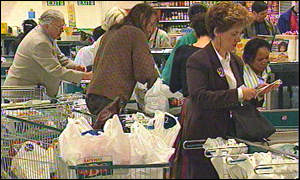What's in a name at the checkout?
South Wales Evening Post - 8 October 2013
You’ve been there. You arrive at the supermarket checkout with a glint of triumph in your eyes at finding the shortest queue. Just then, victory is cruelly snatched away as the operator says, “Sorry I’m closing".
It almost happened to me the other day. I was on my final approach as I locked eyes with the young man at the till. He’d spotted me homing in on my target and was already reaching for the plastic thingy.
It was probably the mixture of panic and psychotic anger forming on my face that made him concede with, "Closing after you, mate".
As I placed my bargains on the conveyor, relief was replaced by a question that has been nagging me for a while.
What's this 'mate' business? And for that matter when did I become 'pal', 'skip' or 'chum' or anything resembling a dog food brand?
As time puts me more in touch with my Victor Meldrew persona, so I find myself asking why it is that male members of supermarket staff insist on addressing you by any title other than 'Sir'?
Perhaps it's because they hear their female colleagues addressing customers as 'Luv', 'Darling', 'Babes', 'Sweetheart' and other endearments. All of which are no doubt intended as friendly politeness but still catch me unawares so that I need to do a double-take in case I might be snubbing someone I know.

Are supermarkets a bit too matey?
I suppose that it’s all harmless enough. That is, until you try responding in the same way.
A while back, I was returning something or other at a customer services desk. The fellow who was about to serve me was distracted by a colleague's query.
"Be with you in a minute, mate", he said over his shoulder.
"Take your time, pal", I responded with just enough weight on the last word to cause a brief hesitancy before he disappeared into the tobacco section.
It was clear from his subdued body-language and lack of eye contact when he returned that he now feared I was about to launch myself over the counter at any moment brandishing a specially sharpened till receipt.
I also got the distinct feeling that he’d shared his fears about me with the security guy - identifiable by his shaven head, tattooed forearms and nasal earring. This individual grudgingly moved over from his favourite spot by the crisps and into my personal space for the rest of the transaction.
"Everything all right, Sir?" he enquired with just enough subtle menace for me to reflexively scrunch up my reusable carrier bag.
"You tell me", I mumbled as I skulked off towards the exit.
Smarter doesn’t always mean cheaper
Times are tough, and likely to get a lot tougher if you're in the public sector.
There may be signs of recovery elsewhere but the future picture for local authorities, just like every other public body, is a grim one.
I can understand the pressures facing Swansea finance cabinet member Rob Stewart. When we spoke last week he was very clear that it was no longer possible to sidestep further Treasury crackdowns with clever budgeting or by delaying a few schemes.
Besides the estimated ten percent drop in government support, Swansea’s room for maneuver is hampered by substantial historical debt plus what’s known as ‘unsupported borrowing’ – similar to credit card debt – which he says was racked up while his party was out of office.
Be that as it may, it’s a critical time for the council. All the more reason then to look at ways of obtaining part of the £45 million in necessary savings through doing things smarter and not just cheaper.
One obvious step is to begin reducing the cost of running some services by providing them on-line. A likely candidate is the Swansea Leader newspaper.
Yes I know; I was responsible for setting up the paper which opponents gleefully christened the “Daily Bailey” – although that didn’t stop them for continuing to publish it themselves for the next eight years. Even so the paper came about under very different commercial circumstances than we have today.
I'd add that it's definitely time to take a hard look at council websites from the perspective of a service user seeking quick access and in need of advice. There is already a wide range available, if you know where to look, but there's also potential to improve things with on-line access to a service advisor.
Of course, web technology is not the answer to everything and I’ve had my ear bent recently over proposals to televise Swansea council debates in an upgraded chamber.
Political anoraks like me should probably be the last to offer an opinion. But while I’m all for giving people a better idea of how local government works it’s also important for councils to remember that most people regard themselves these days more as service users than as citizens. As such, value for money plays an overriding part in public thinking.
Politicians may get agitated over the point, but the truth is that the people they represent are a lot more interested in the quality of the actual outcome than having televised access to the process by which it’s reached.